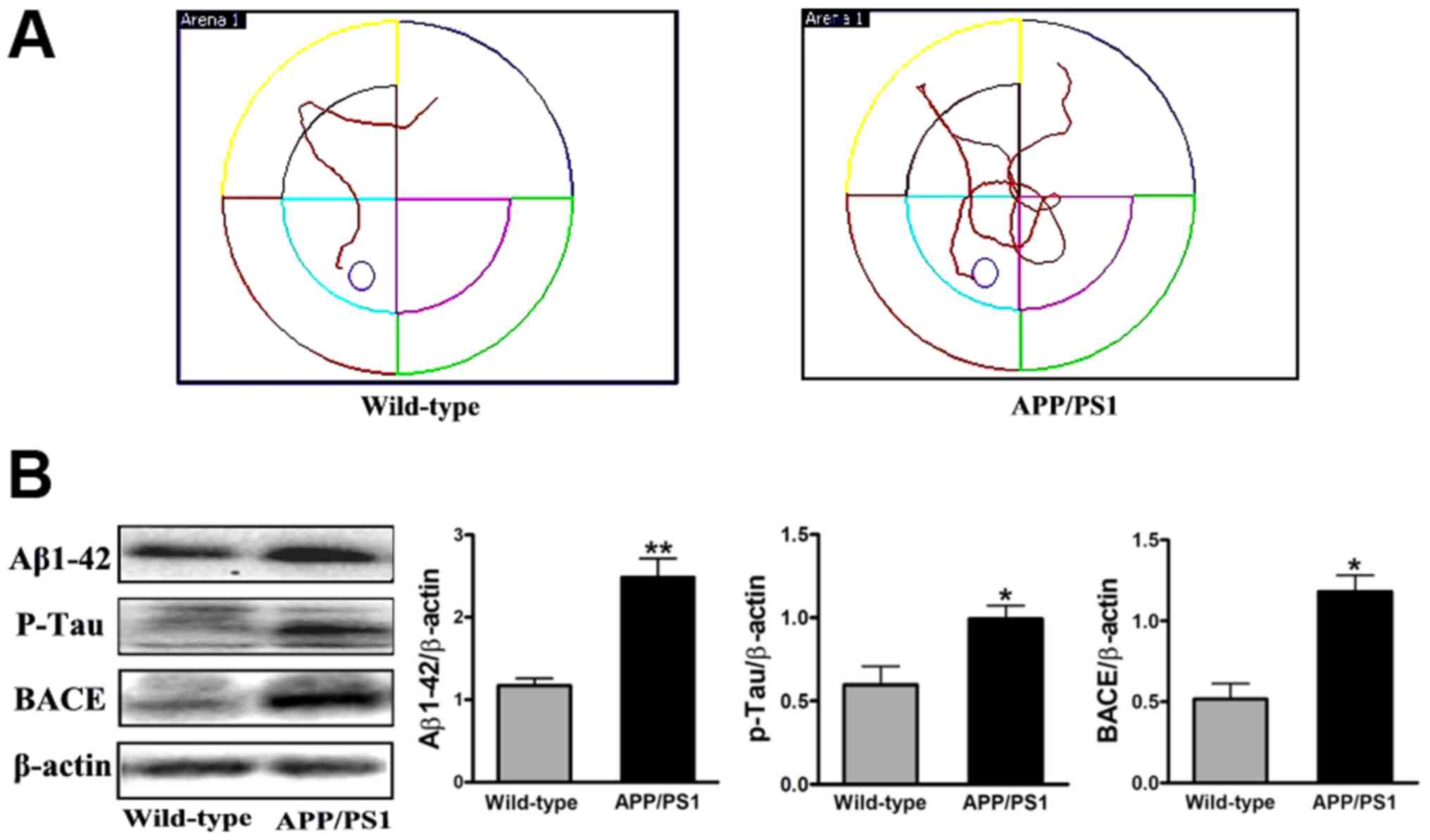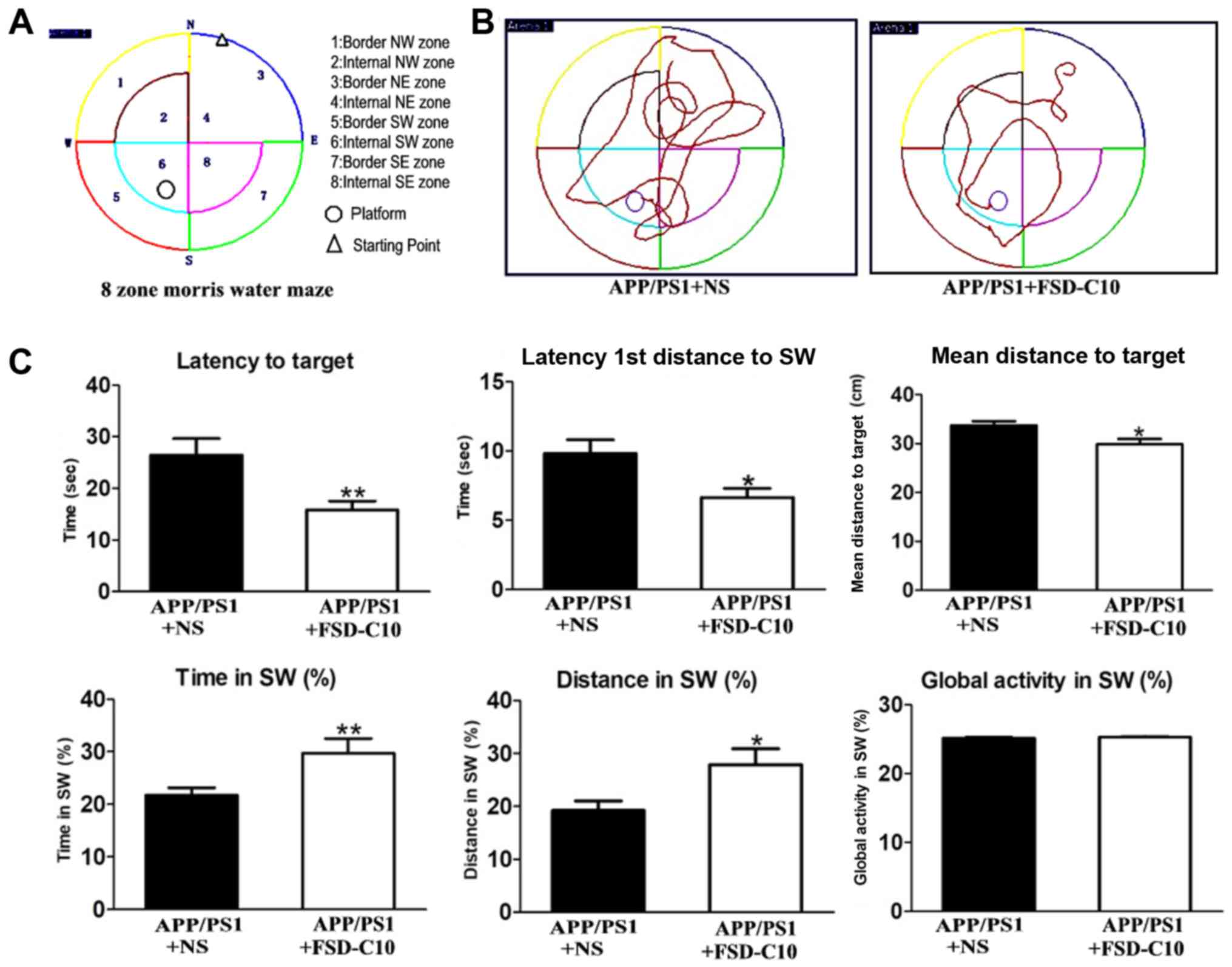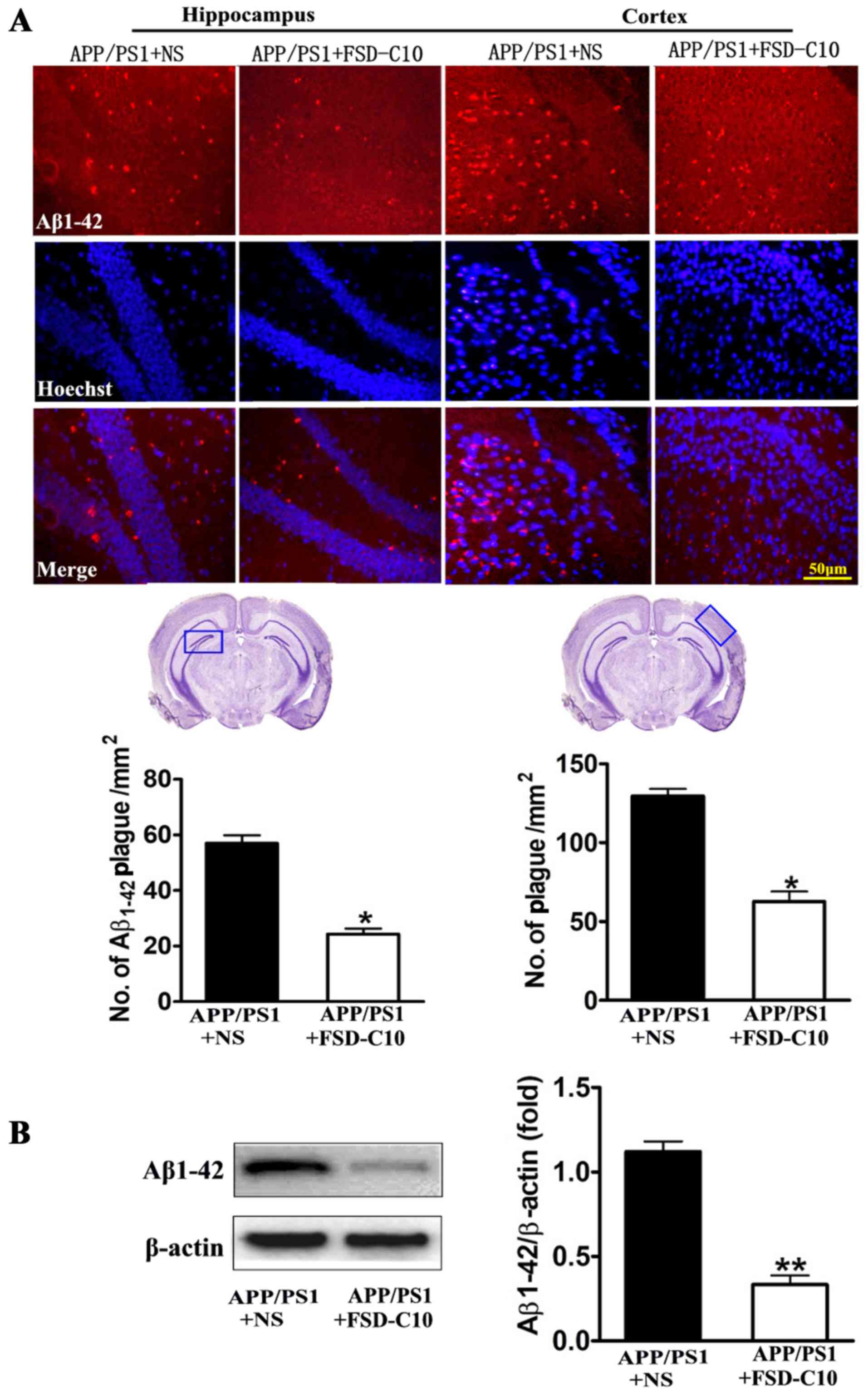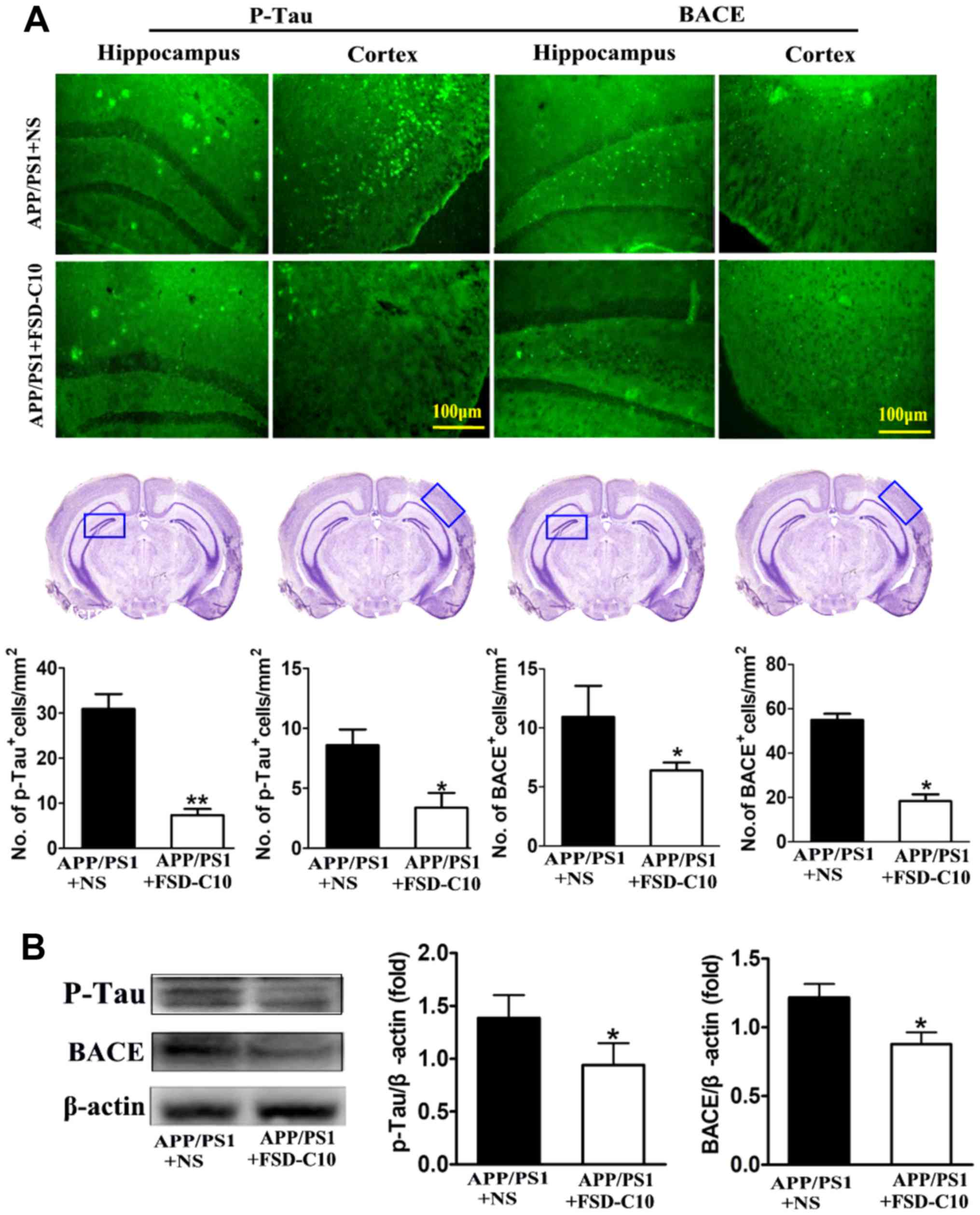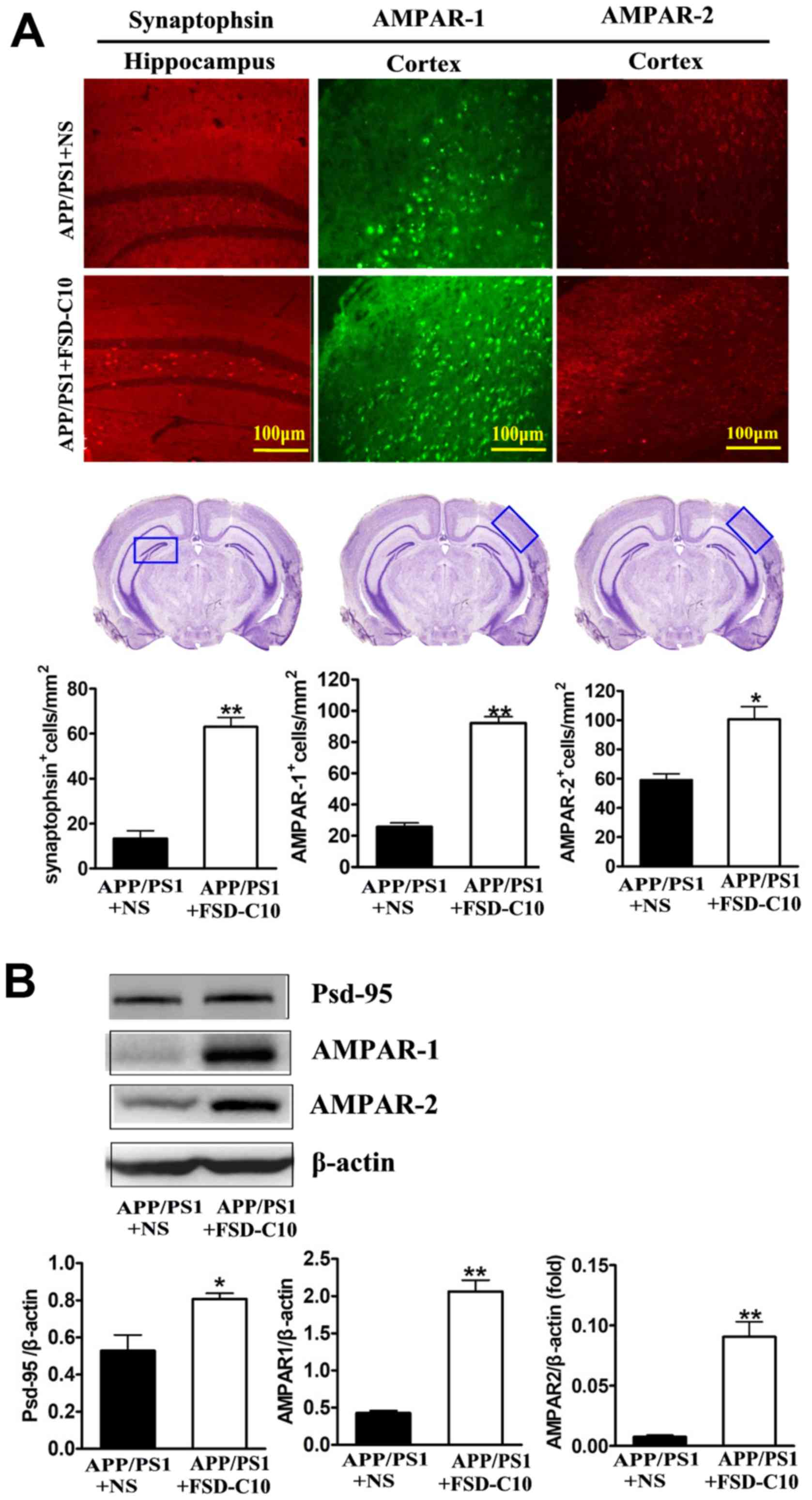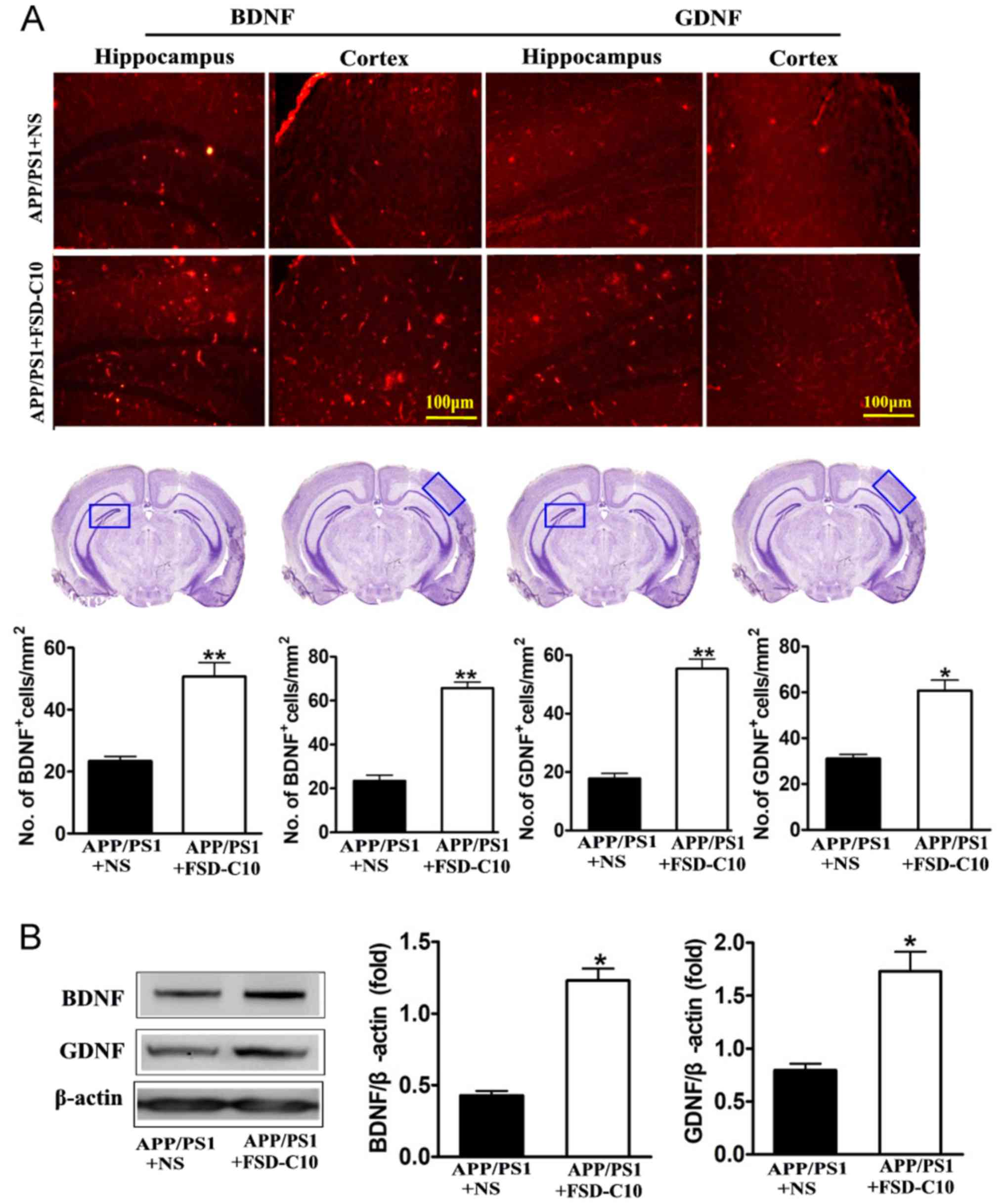|
1
|
Goedert M and Spillantini MG: A century of
Alzheimer's disease. Science. 314:777–781. 2006. View Article : Google Scholar : PubMed/NCBI
|
|
2
|
Khalil Bou R, Khoury E and Koussa S:
Linking multiple pathogenic pathways in Alzheimer's disease. World
J Psychiatry. 6:208–214. 2016. View Article : Google Scholar : PubMed/NCBI
|
|
3
|
Ferrer I: Defining Alzheimer as a common
age-related neurodegenerative process not inevitably leading to
dementia. Prog Neurobiol. 97:38–51. 2012. View Article : Google Scholar : PubMed/NCBI
|
|
4
|
Scheltens P, Blennow K, Breteler MM, de
Strooper B, Frisoni GB, Salloway S and Van der Flier WM:
Alzheimer'sdisease. Lancet. 388:505–517. 2016. View Article : Google Scholar : PubMed/NCBI
|
|
5
|
Jiang T, Sun Q and Chen S: Oxidative
stress: A major pathogenesis and potential therapeutic target of
antioxidative agents in Parkinson's diseaseand Alzheimer's disease.
Prog Neurobiol. 147:1–19. 2016. View Article : Google Scholar : PubMed/NCBI
|
|
6
|
Onyango IG, Dennis J and Khan SM:
Mitochondrial dysfunction in alzheimer's disease and the rationale
for bioenergetics based therapies. Aging Dis. 7:201–214. 2016.
View Article : Google Scholar : PubMed/NCBI
|
|
7
|
Ransohoff RM: How neuroinflammation
contributes to neurodegeneration. Science. 353:777–783. 2016.
View Article : Google Scholar : PubMed/NCBI
|
|
8
|
Cai Y, Arikkath J, Yang L, Guo ML,
Periyasamy P and Buch S: Interplay of endoplasmic reticulum stress
and autophagy in neurodegenerative disorders. Autophagy.
12:225–244. 2016. View Article : Google Scholar : PubMed/NCBI
|
|
9
|
Duran-Aniotz C, Cornejo VH and Hetz C:
Targeting endoplasmic reticulum acetylation to restore proteostasis
in Alzheimer's disease. Brain. 139:650–652. 2016. View Article : Google Scholar : PubMed/NCBI
|
|
10
|
Hoeijimakers L, Heinen Y, van Dam AM,
Lucassen PJ and Korasi A: Microglial priming and Alzheimer's
disease: A possible Role for (Early) immune challenges and
epigenetics? Front Hum Neurosci. 10:3982016.PubMed/NCBI
|
|
11
|
Olsen I and Singhrao SK: Inflammation
involvement in alzheimer's disease. J Alzheimer's Dis. 54:45–53.
2016. View Article : Google Scholar
|
|
12
|
Torika N, Asraf K, Roasso E, Danon A and
Fleisher-Berkovich S: Angiotensin converting enzyme inhibitors
ameliorate braininflammation associated with microglial activation:
Possible implication for Alzheimer's disease. J Neueoimmune
Pharmacol. 11:774–785. 2016. View Article : Google Scholar
|
|
13
|
Wallker DG and Lue LF: Immune phenotypes
of microglial in humane neurodegenerativedisease: Challenges to
detecting microglial polarization in human brains. Alzheimers Res
Ther. 7:562015. View Article : Google Scholar : PubMed/NCBI
|
|
14
|
Heneka MT, Kummer MP, Stutz A, Delekate A,
Schwartz S, Vieira-Saecker A, Gripe A, Axt D, Remus A, Remus A, et
al: NLRP3 is actived in Alzheimer's disease and contributes to
pathology in APP/PS1mice. Nature. 493:674–678. 2013. View Article : Google Scholar : PubMed/NCBI
|
|
15
|
Glass CK, Saijo K, Winner B, Marchetto MC
and Gage FH: Mechanisms underlying inflammation in
neurodegeneration. Cell. 140:918–934. 2010. View Article : Google Scholar : PubMed/NCBI
|
|
16
|
Trammtola A, Di Domenico F, Barone E,
Perluigi M and Butterfield DA: It is all about (U)biquitin: role of
altered ubiquitin-proteasome system and UCHLI in Alzheimer's
Disease. Oxid Med Cell Longev 2756068. 2016. View Article : Google Scholar
|
|
17
|
Deardorff WJ and Grossberg GT: Targeting
neuroinflammation in Alzheimer's disease: Evidence for NASIDs and
novel therapeutics. Expert Rev Neurother. 17:17–32. 2017.
View Article : Google Scholar : PubMed/NCBI
|
|
18
|
Miguel-Álvarez M, Santos-Lozano A,
Sanchis-Gomar F, Fiuza-Luces C, Pareja-Galeano H, Garatachea N and
Lucia A: Non-steroidal anti-inflammmatory drugs as a treatment for
Alzheimer's disease: A systematic review and meta-analysis of
treatment effect. Drugs Aging. 32:139–147. 2015. View Article : Google Scholar : PubMed/NCBI
|
|
19
|
Mueller BK, Mack H and Teusch N: Rho
kinase, a promising drug target for neurogical disorders. Nat Rev
Drug Discov. 4:387–398. 2005. View
Article : Google Scholar : PubMed/NCBI
|
|
20
|
Petraos S, Li QX, George AJ, Hou X, Kerr
ML, Unabia SE, Hatzinisiriou I, Maksel D, Aguilar MI and Small DH:
The beta-amyloid protein of Alzheimer's disease increase neuronal
CRMP-2 phosphorylation by a Rho-GTP mechanism. Brain. 131:90–108.
2008. View Article : Google Scholar : PubMed/NCBI
|
|
21
|
Bauer PO, Wong HK, Oyama F, Goswami A,
Okuno M, Kino Y, Miyazaki H and Nukina N: Inhbition of Rho kinases
enhances the degradation of mutant huntingtin. J Boiol Chem.
284:13153–13164. 2009. View Article : Google Scholar
|
|
22
|
Herskowitz JH, Feng Y, Mattheyses AL,
Hales CM, Higginbotham LA, Duong DM, Montine TJ, Troncoso JC,
Thambisetty M, Seyfried NT, et al: Pharmacologic inhibition of
ROCK2 suppresses amyloid-β production in an Alzheimer's disease
mouse model. J Neurosci. 33:19086–19098. 2013. View Article : Google Scholar : PubMed/NCBI
|
|
23
|
Couch BA, DeMarco GJ, Gourley SL and
Koleske AJ: Increased dendrite branching in AbetaPP/PS1 mice and
elongation of dendrite arbors by fasudil administration. J
Alzheimers Dis. 20:1003–1008. 2010. View Article : Google Scholar : PubMed/NCBI
|
|
24
|
Yu JZ, Li YH, Liu CY, Wang Q, Gu QF, Wang
HQ, Zhang GX, Xiao BG and Ma CG: Multitarget therapeutic effect of
fasudil in APP/PS1transgenic mice. CNS Neurol Disord Drug Targets.
16:199–209. 2017. View Article : Google Scholar : PubMed/NCBI
|
|
25
|
Hong S, Beja-Glasser VF, Nfonoyim BM,
Frouin A, Li S, Ramakrishnan S, Merry KM, Shi Q, Rosenthal A,
Barres BA, et al: Complement and microglia mediate early synapse
loss in Alzheimer mouse models. Science. 352:712–716. 2016.
View Article : Google Scholar : PubMed/NCBI
|
|
26
|
Terry RD, Masliah E, Salmon DP, Butters N,
DeTeresa R, Hill R, Hansen LA and Katzman R: Physical basis of
cognitive alterations in Alzheimer's disease: Synapse loss is the
major correlate of cognitive impairment. Ann Neurol. 30:572–580.
1991. View Article : Google Scholar : PubMed/NCBI
|
|
27
|
Almeida CG, Tampellini D, Takahashi RH,
Greengard P, Lin MT, Snyder EM and Gouras GK: Beta-amyloid
accumulation in APP mutant neurons reduces PSD-95 and GluR1 in
synapses. Neurobiol Dis. 20:187–198. 2005. View Article : Google Scholar : PubMed/NCBI
|
|
28
|
Huang EJ and Reichardt LF: Neurotrophins:
Roles in neuronal development and function. Annu Rev Neurosci.
24:677–736. 2001. View Article : Google Scholar : PubMed/NCBI
|
|
29
|
Waterhouse EG and Xu B: New insights into
the role of brain-derived neurotrophic factor in synaptic
plasticity. Mol Cell Neurosci. 42:81–89. 2009. View Article : Google Scholar : PubMed/NCBI
|
|
30
|
Prvulovic D and Hampel H: Amyloid β (Aβ)
and phospho-tau (p-tau) as diagnostic biomarkers in Alzheimer's
disease. Clin Chem Lab Med. 49:367–374. 2011. View Article : Google Scholar : PubMed/NCBI
|
|
31
|
Tohda C, Ichimura M, Bai Y, Tanaka K, Zhu
S and Komatsu K: Inhibitory effects of Eleutherococcus senticosus
extracts on amyloid beta(25–35)-induced neuritic atrophy and
synaptic loss. J Pharmacol Sci. 107:329–339. 2008. View Article : Google Scholar : PubMed/NCBI
|
|
32
|
Zhang ZH, Yu LJ, Hui XC, Wu ZZ, Yin KL,
Yang H and Xu Y: Hydroxy-safflor yellow A attenuates
Aβ1–42-induced inflammation by modulating the
JAK2/STAT3/NF-κB pathway. Brain Res. 1563:72–80. 2014. View Article : Google Scholar : PubMed/NCBI
|
|
33
|
Morroni F, Sita G, Tarozzi A, Rimondini R
and Hrelia P: Early effects of Aβ1–42 oligomers injection in mice:
Involvement of PI3K/Akt/GSK3 and MAPK/ERK1/2 pathways. Behav Brain
Res. 314:106–115. 2016. View Article : Google Scholar : PubMed/NCBI
|
|
34
|
Sevigny J, Chiao P, Bussière T, Weinreb
PH, Williams L, Maier M, Dunstan R, Salloway S, Chen T, Ling Y, et
al: The antibody aducanumab reduces Aβ plaques in Alzheimer's
disease. Nature. 537:50–56. 2016. View Article : Google Scholar : PubMed/NCBI
|
|
35
|
Mateo I, Vázquez-Higuera JL, Sánchez-Juan
P, Rodríguez-Rodríguez E, Infante J, García-Gorostiaga I, Berciano
J and Combarros O: Epistasis between tau phosphorylation regulating
genes (CDK5R1 and GSK-3beta) and Alzheimer's disease risk. Acta
Neurol Scand. 120:130–133. 2009. View Article : Google Scholar : PubMed/NCBI
|
|
36
|
Goedert M: Neurofibrillary pathology of
Alzheimer's disease and other tauopathies. Prog Brain Res.
117:287–306. 1998. View Article : Google Scholar : PubMed/NCBI
|
|
37
|
Cummings J, Aisen PS, DuBois B, Frölich L,
Jack CR Jr, Jones RW, Morris JC, Raskin J, Dowsett SA and Scheltens
P: Drug development in Alzheimer's disease: The path to 2025.
Alzheimers Res Ther. 8:392016. View Article : Google Scholar : PubMed/NCBI
|
|
38
|
Xin YL, Yu JZ, Yang XW, Liu CY, Li YH,
Feng L, Chai Z, Yang WF, Wang Q, Jiang WJ, et al: FSD-C10: A more
promising novel ROCK inhibitor than Fasudil for treatment of CNS
autoimmunity. Biosci Rep. 35:pii: e00247. 2015. View Article : Google Scholar : PubMed/NCBI
|
|
39
|
Salminen A, Suuronen T and Kaarniranta K:
ROCK, PAK, and Toll of synapses in Alzheimer's disease. Biochem
Biophys Res Commun. 371:587–590. 2008. View Article : Google Scholar : PubMed/NCBI
|
|
40
|
Bobo-Jiménez V, Delgado-Esteban M,
Angibaud J, Sánchez-Morán I, de la Fuente A, Yajeya J, Nägerl UV,
Castillo J, Bolaños JP and Almeida A: APC/CCdh1-Rock2
pathway controls dendritic integrity and memory. Proc Natl Acad Sci
USA. 114:4513–4518. 2017. View Article : Google Scholar : PubMed/NCBI
|
|
41
|
Henderson BW, Gentry EG, Rush T, Troncoso
JC, Thambisetty M, Montine TJ and Herskowitz JH: Rho-associated
protein kinase 1 (ROCK1) is increased in Alzheimer's disease and
ROCK1 depletion reduces amyloid-β levels in brain. J Neurochem.
138:525–531. 2016. View Article : Google Scholar : PubMed/NCBI
|
|
42
|
Arimura N, Ménager C, Kawano Y, Yoshimura
T, Kawabata S, Hattori A, Fukata Y, Amano M, Goshima Y, Inagaki M,
et al: Phosphorylation by Rho kinase regulates CRMP-2 activity in
growth cones. Mol Cell Biol. 25:9973–9984. 2005. View Article : Google Scholar : PubMed/NCBI
|
|
43
|
Swanger SA, Mattheyses AL, Gentry EG and
Herskowitz JH: ROCK1 and ROCK2 inhibition alters dendritic spine
morphology in hippocampal neurons. Cell Logist. 5:e11332662016.
View Article : Google Scholar : PubMed/NCBI
|
|
44
|
Song Y, Chen X, Wang LY, Gao W and Zhu MJ:
Rho kinase inhibitor fasudil protects against β-amyloid-induced
hippocampal neurodegeneration in rats. CNS Neurosci Ther.
19:603–610. 2013. View Article : Google Scholar : PubMed/NCBI
|
|
45
|
Li YH, Yu JZ, Liu CY, Zhang H, Zhang HF,
Yang WF, Li JL, Feng QJ, Feng L, Zhang GX, et al: Intranasal
delivery of FSD-C10, a novel Rho kinase inhibitor, exhibits
therapeutic potential in experimental autoimmune encephalomyelitis.
Immunology. 143:219–229. 2014. View Article : Google Scholar : PubMed/NCBI
|
|
46
|
Revett TJ, Baker GB, Jhamandas J and Kar
S: Glutamate system, amyloid ß peptides and tau protein: Functional
interrelationships and relevance to Alzheimer disease pathology. J
Psychiatry Neurosci. 38:6–23. 2013. View Article : Google Scholar : PubMed/NCBI
|
|
47
|
Masoudian N, Riazi GH, Afrasiabi A,
Modaresi SM, Dadras A, Rafiei S, Yazdankhah M, Lyaghi A, Jarah M,
Ahmadian S and Seidkhani H: Variations of glutamate concentration
within synaptic cleft in the presence of electromagnetic fields: An
artificial neural networks study. Neurochem Res. 40:629–642. 2015.
View Article : Google Scholar : PubMed/NCBI
|
|
48
|
Anggono V, Tsai LH and Götz J: Glutamate
receptors in Alzheimer's disease: Mechanisms and therapies. Neural
Plast. 2016:82561962016. View Article : Google Scholar : PubMed/NCBI
|
|
49
|
Dong Z, Han H, Li H, Bai Y, Wang W, Tu M,
Peng Y, Zhou L, He W, Wu X, et al: Long-term potentiation decay and
memory loss are mediated by AMPAR endocytosis. J Clin Invest.
125:234–247. 2015. View Article : Google Scholar : PubMed/NCBI
|
|
50
|
Hsieh H, Boehm J, Sato C, Iwatsubo T,
Tomita T, Sisodia S and Malinow R: AMPAR removal underlies
Abeta-induced synaptic depression and dendritic spine loss. Neuron.
52:831–843. 2006. View Article : Google Scholar : PubMed/NCBI
|
|
51
|
Keith D and El-Husseini A: Excitation
control: Balancing PSD-95 function at the synapse. Front Mol
Neurosci. 1:42008. View Article : Google Scholar : PubMed/NCBI
|
|
52
|
Valtorta F, Pennuto M, Bonanomi D and
Benfenati F: Synaptophysin: Leading actor or walk-on role in
synaptic vesicle exocytosis? Bioessays. 26:445–453. 2004.
View Article : Google Scholar : PubMed/NCBI
|
|
53
|
Poo MM: Neurotrophins as synaptic
modulators. Nat Rev Neurosci. 2:24–32. 2001. View Article : Google Scholar : PubMed/NCBI
|
|
54
|
Lessmann V, Gottmann K and Malcangio M:
Neurotrophin secretion: Current facts and future prospects. Prog
Neurobiol. 69:341–374. 2003. View Article : Google Scholar : PubMed/NCBI
|
|
55
|
Bimonte HA, Nelson ME and Granholm AC:
Age-related deficits as working memory load increases:
Relationships with growth factors. Neurobiol Aging. 24:37–48. 2003.
View Article : Google Scholar : PubMed/NCBI
|
|
56
|
Straten G, Eschweiler GW, Maetzler W,
Laske C and Leyhe T: Glial cell-line derived neurotrophic factor
(GDNF) concentrations in cerebrospinal fluid and serum of patients
with early Alzheimer's disease and normal controls. J Alzheimers
Dis. 18:331–337. 2009. View Article : Google Scholar : PubMed/NCBI
|
|
57
|
Forlenza OV, Miranda AS, Guimar I, Talib
LL, Diniz BS, Gattaz WF and Teixeira AL: Decreased neurotrophic
support is associated with cognitive decline in non-demented
subjects. J Alzheimers Dis. 46:423–429. 2015. View Article : Google Scholar : PubMed/NCBI
|
|
58
|
Pertusa M, García-Matas S, Mammeri H,
Adell A, Rodrigo T, Mallet J, Cristòfol R, Sarkis C and Sanfeliu C:
Expression of GDNF transgene in astrocytes improves cognitive
deficits in aged rats. Neurobiol Aging. 29:1366–1379. 2008.
View Article : Google Scholar : PubMed/NCBI
|















